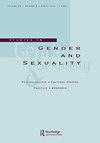女性化的“是”:让我回归过度
Q3 Social Sciences
引用次数: 0
摘要
本文认为女性的想象、欲望和过剩原则对于临床工作和社会的活力是必要的。虽然渴望恰恰是任何新的主体性的来源,但渴望超越必要的东西在很大程度上被认为是禁忌。在这里,女性化的“是”是“过度”的同义词,这篇文章的主要目的是强调过度的美德,否则过度的限制似乎对生活有害。具体地说,过剩提供了必要的空间,让我们回到被压抑的内容,回到尚未实现的东西,回到可能性的原始源泉。母系氏族结构作为当代精神分析的新基础进行了探索。正是在母系社会的空间里,我们发现了没有竞争等级的多样性,对影响的重视超过了线性,最重要的是,女性作为自己权利的不妥协的欲望模型,在精神分析中经常缺乏。本文章由计算机程序翻译,如有差异,请以英文原文为准。
The Feminine Yes: Return Me to Excess
ABSTRACT This essay argues that the feminine principles of imagination, desire, and excess are necessary for the vitality of clinical work and society. Although longing is precisely the source of any new subjectivity, longing for what exceeds the requisite has in large part been considered taboo. Here, the Feminine Yes is synonymous with excess, and the primary purpose of this essay is to highlight the virtues of excess that have otherwise been overly restricted as if detrimental to life. Specifically, excess offers needed space to return to repressed content, to the not-yet, and to a primordial fount of possibility. Matriarchal structure is explored as a contemporary new foundation for psychoanalysis to this end. It is within matriarchal space that we find multiplicity without competitive hierarchies, value on affect over linearity, and, most importantly, Woman as an uncompromised model of desire in her own right, so frequently lacking in psychoanalysis.
求助全文
通过发布文献求助,成功后即可免费获取论文全文。
去求助
来源期刊

Studies in Gender and Sexuality
Social Sciences-Gender Studies
CiteScore
0.80
自引率
0.00%
发文量
15
期刊介绍:
Beginning in the final two decades of the 20th century, the study of gender and sexuality has been revived from a variety of directions: the traditions of feminist scholarship, postclassical and postmodern psychoanalytic theory, developmental research, and cultural studies have all contributed to renewed fascination with those powerfully formative aspects of subjectivity that fall within the rubric of "gender" and "sexuality." Clinicians, for their part, have returned to gender and sexuality with heightened sensitivity to the role of these constructs in the treatment situation, including the richly variegated ways in which assumptions about gender and sexuality enter into our understandings of "normality" and "pathology."
 求助内容:
求助内容: 应助结果提醒方式:
应助结果提醒方式:


